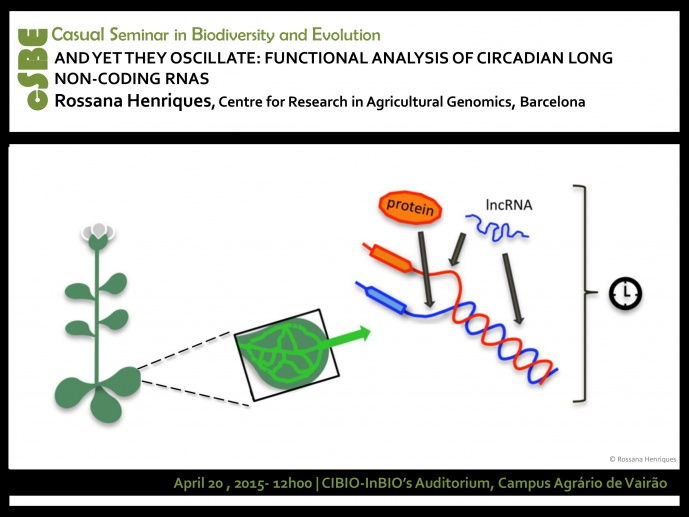AND YET THEY OSCILLATE: FUNCTIONAL ANALYSIS OF CIRCADIAN LONG NON-CODING RNAs

CASUAL SEMINAR IN BIODIVERSITY AND EVOLUTION

Initially described as the “dark matter” of the genome, non-protein coding RNA (ncRNA) is now known to be a major regulator of cellular and developmental processes. Within ncRNAs, long ncRNAs (lncRNAs) have emerged as new players in transcriptional and post-transcriptional regulation. In plants, a wide range of lncRNAs has been identified, but so far only a few functional studies are available. We address plant lncRNA function by focusing on oscillating lncRNAs that are natural antisense transcripts (NATs) with antiphasic expression to their antisense partners. Our results show that some of these Arabidopsis lncRNAs are novel regulators of flowering time, most likely conserved in both in dicot (Arabidopsis) and monocot (rice) species. Understanding the molecular mechanism behind these NAT pair regulation will not only provide new insights into lncRNA function, but also, new biotechnological tools for modulation of a critical crop trait.
Rossana Henriques is a Career Track Fellow at the Centre for Research in Agricultural Genomics in Barcelona. She was recently awarded a Ramón y Cajal Tenure Track contract from the Spanish Government, as well as a Career Integration Grant from the European Commission. She is interested in the circadian regulation of growth signaling pathways as well as the identification and characterization of circadian-regulated long non-coding RNAs.
Rossana was a research associate and postdoctoral fellow at Rockefeller University’s Laboratory of Plant Molecular Biology in New York where she focused on post-translational regulation within the light signaling pathway and the circadian clock. She also worked as postdoctoral fellow at Royal Holloway, University of London on the signaling pathways connecting cell growth and cell division in Arabidopsis.
Rossana earned her MSc in Biology from the Universidade de Coimbra and her PhD in Molecular Biology from the Universidade de Lisboa in collaboration with the Max-Planck Institute for Plant Breeding Research in Cologne.
[Host: Nuno Ferrand de Almeida, Population Genetics, Hybridization and Speciation]
Image credits: Rossana Henriques